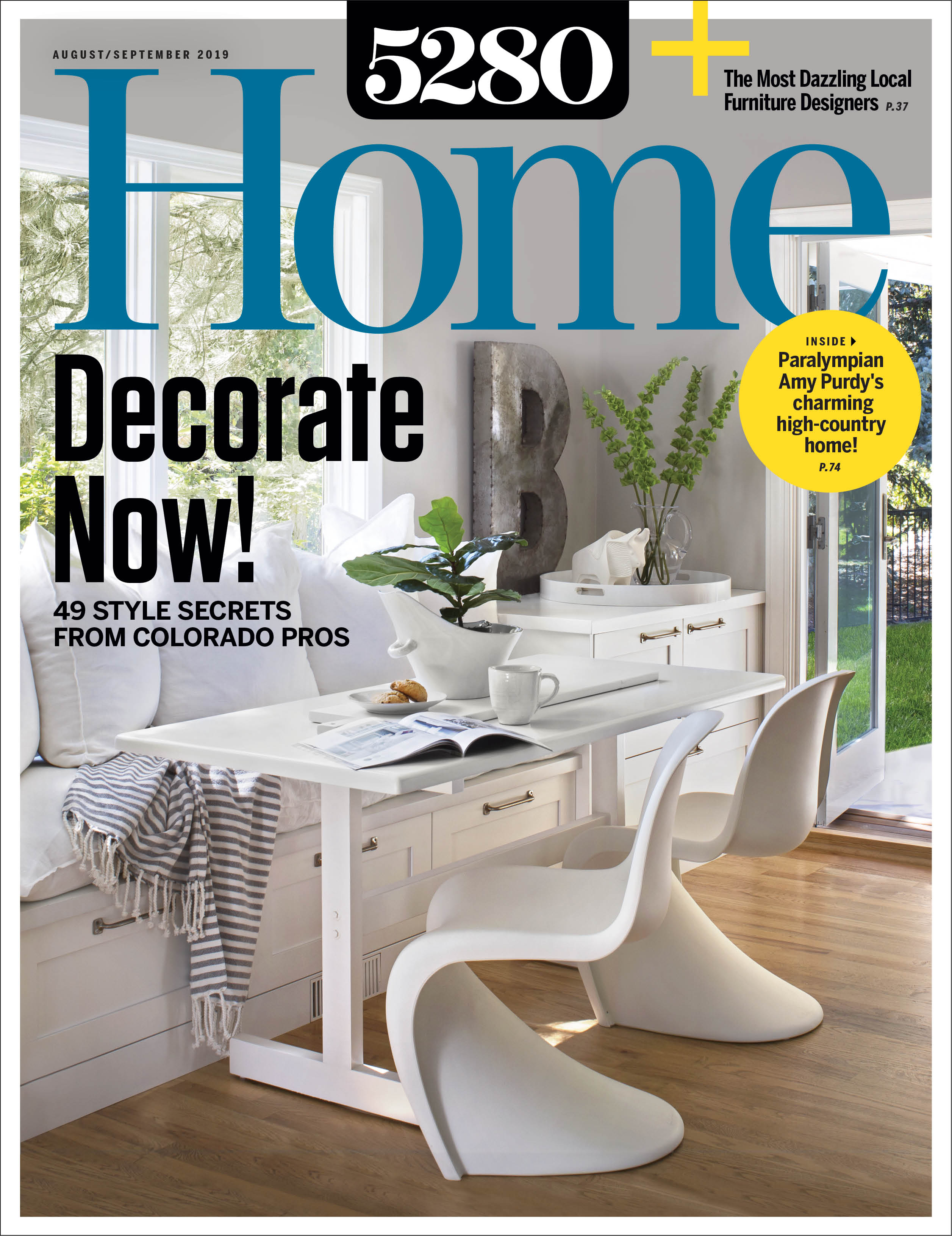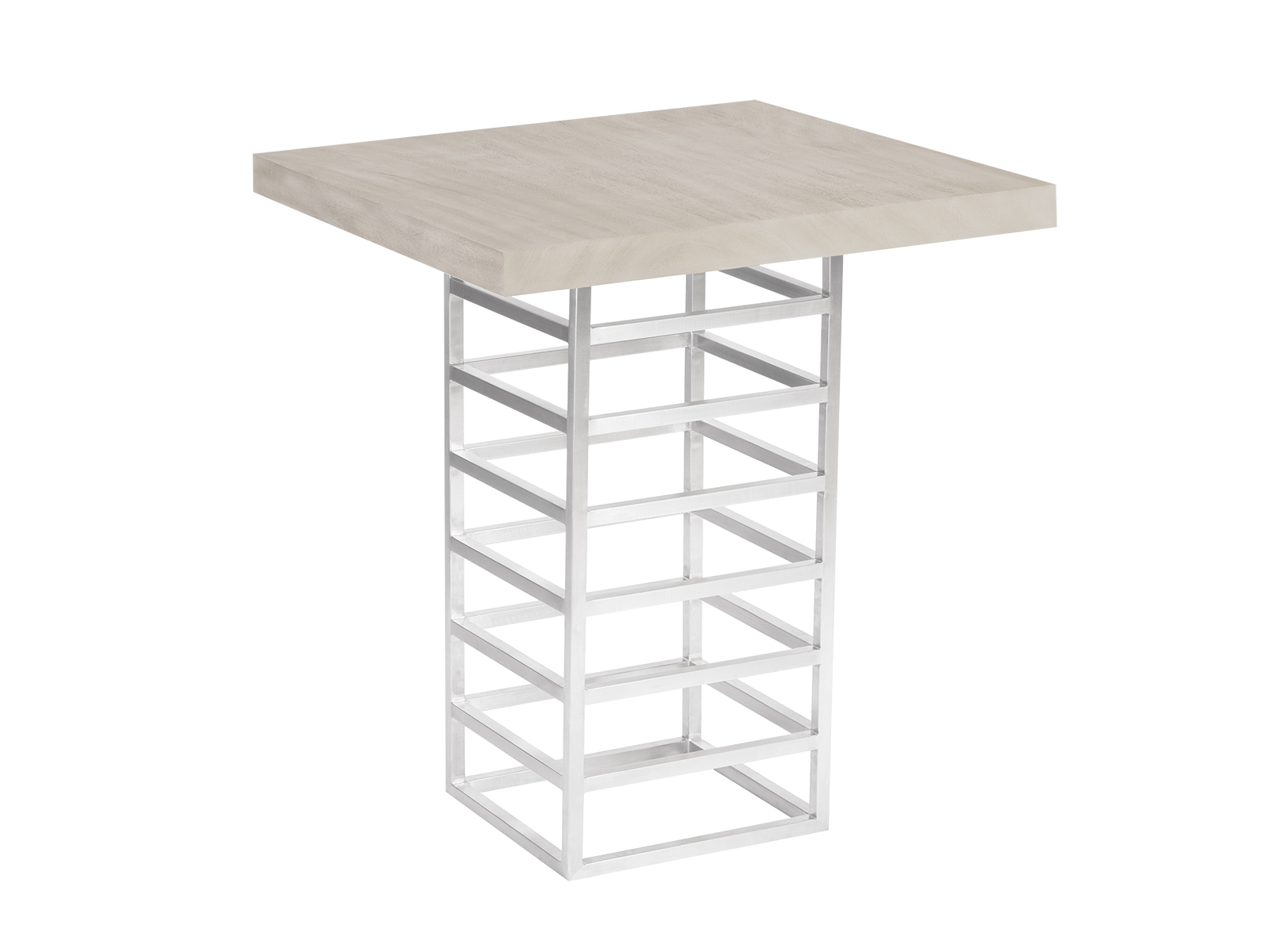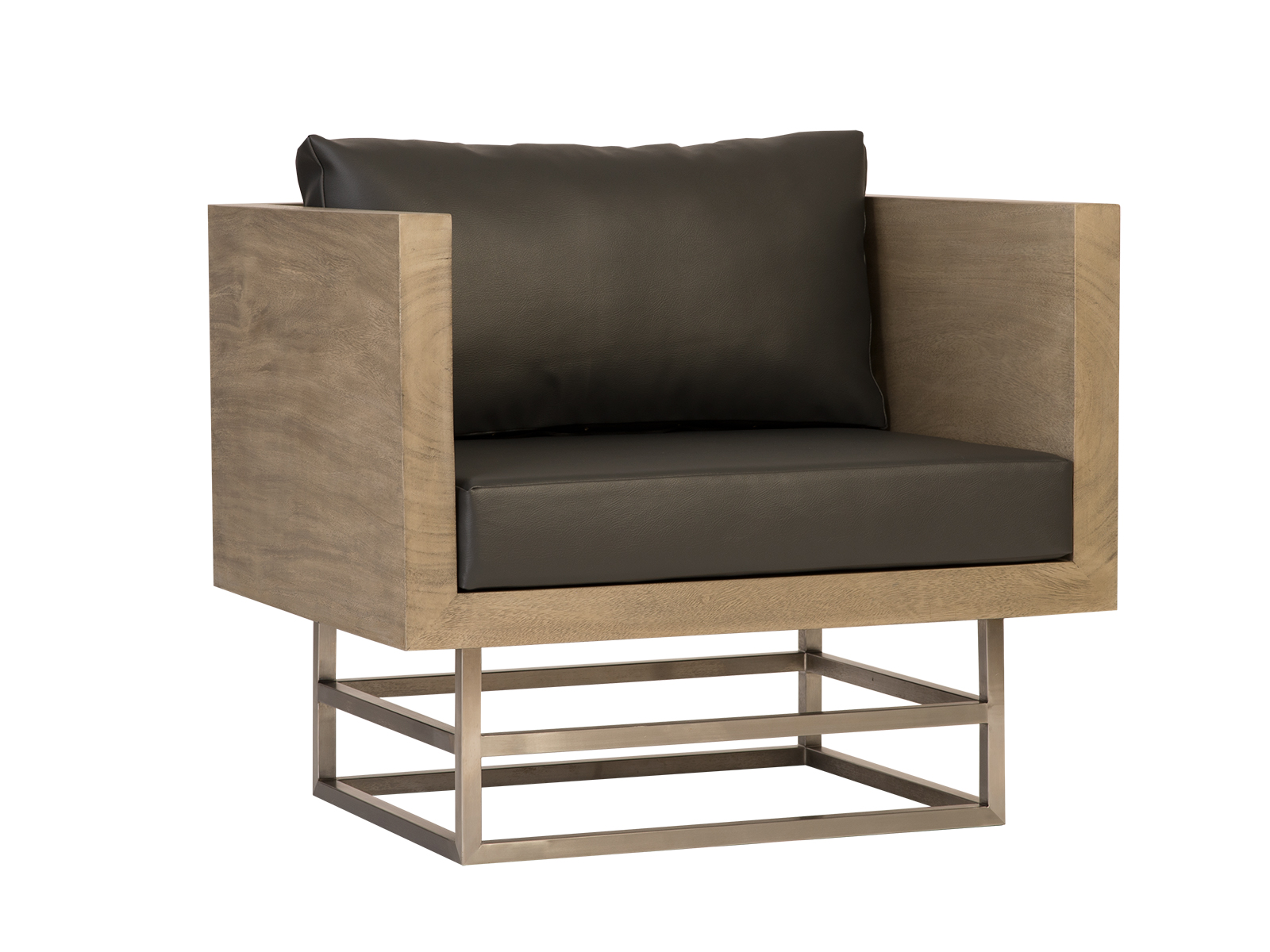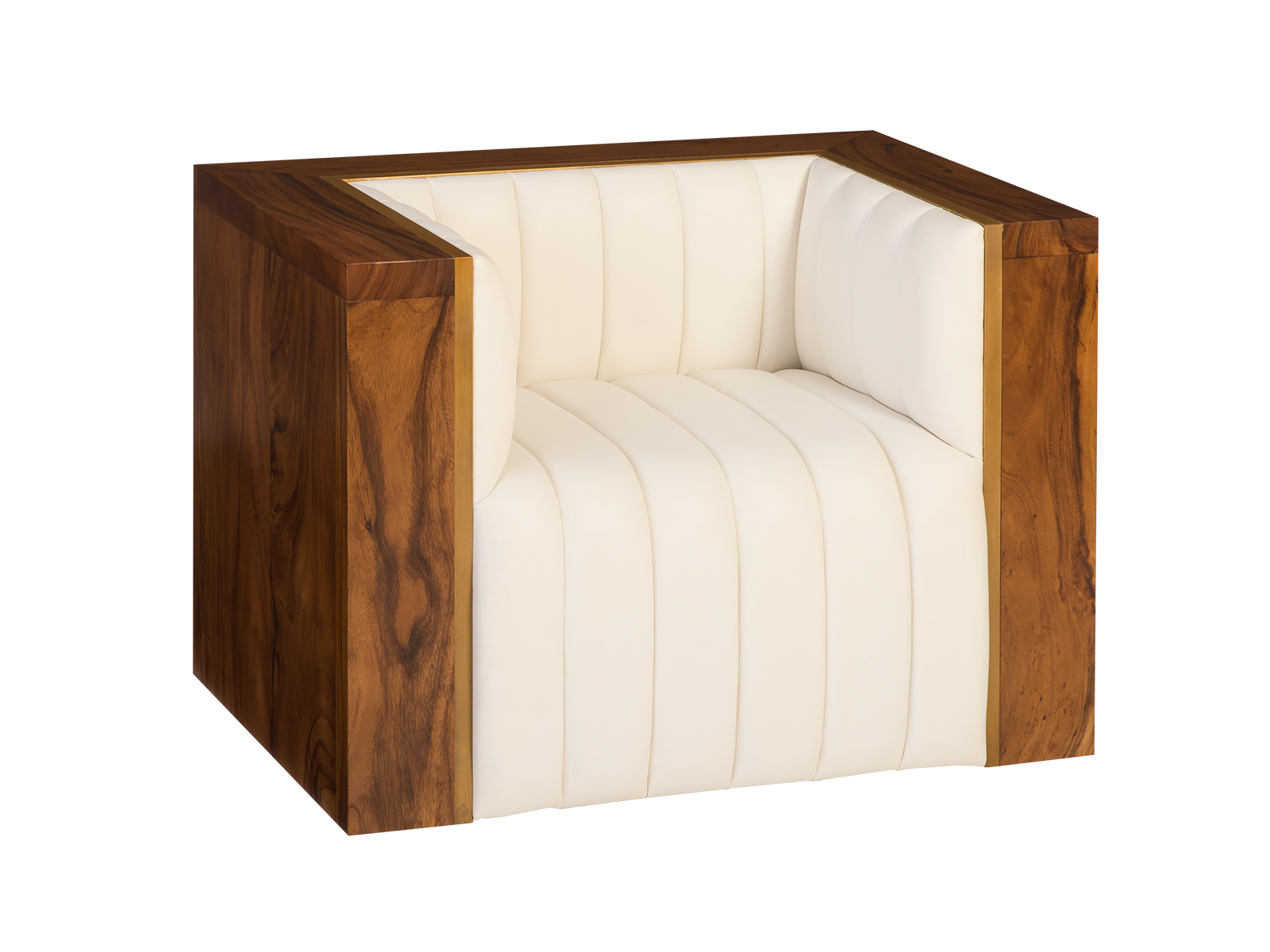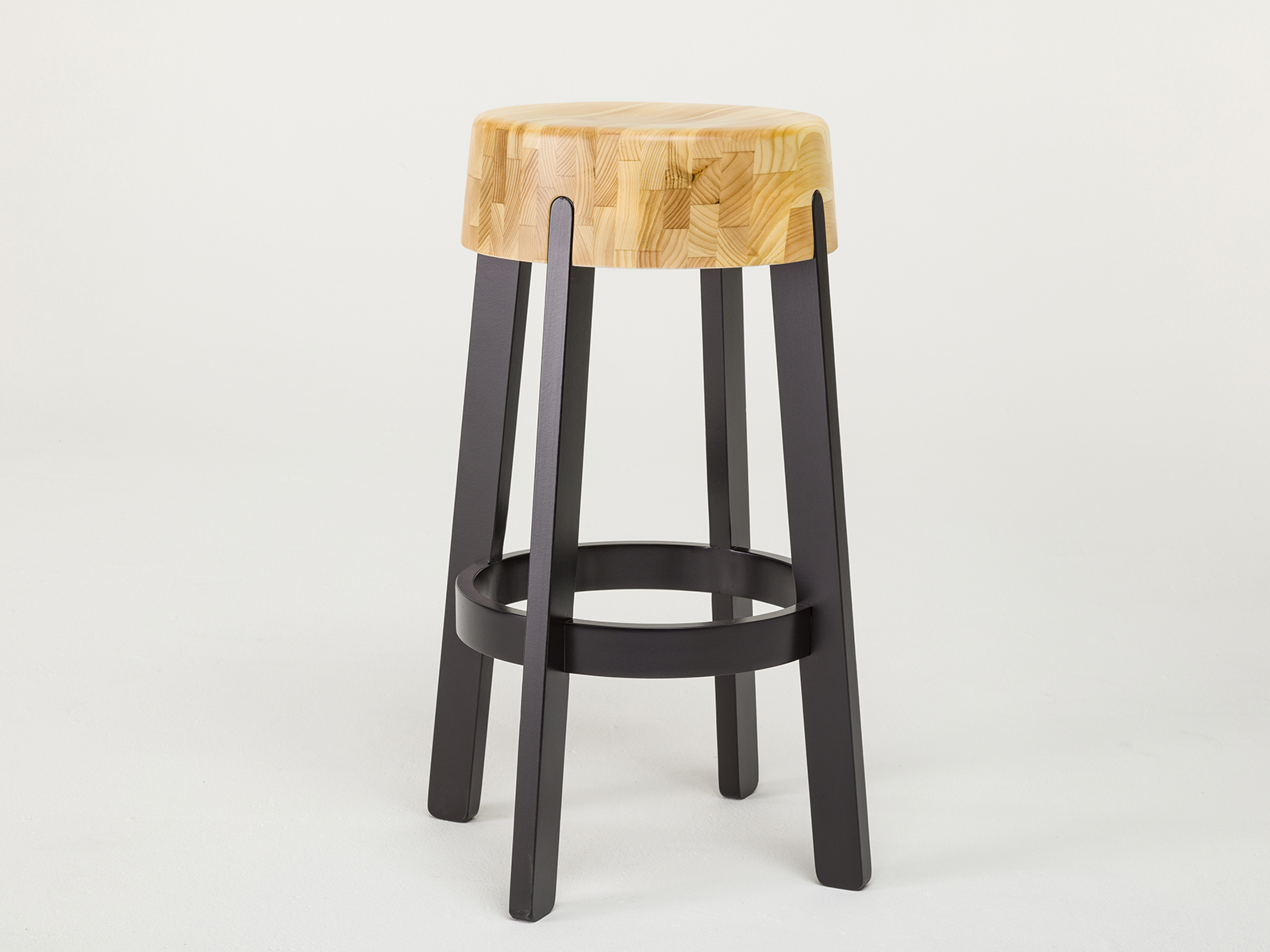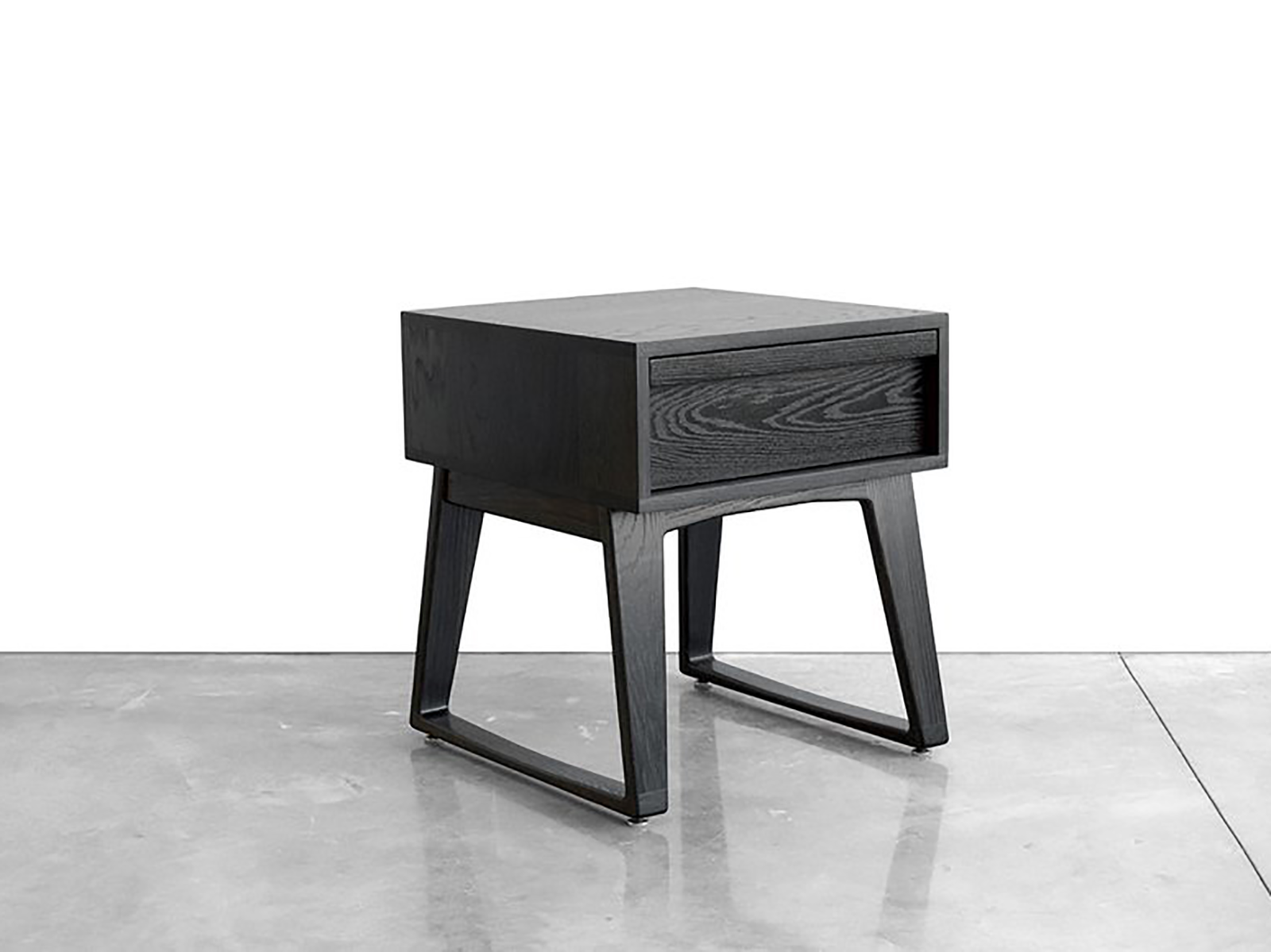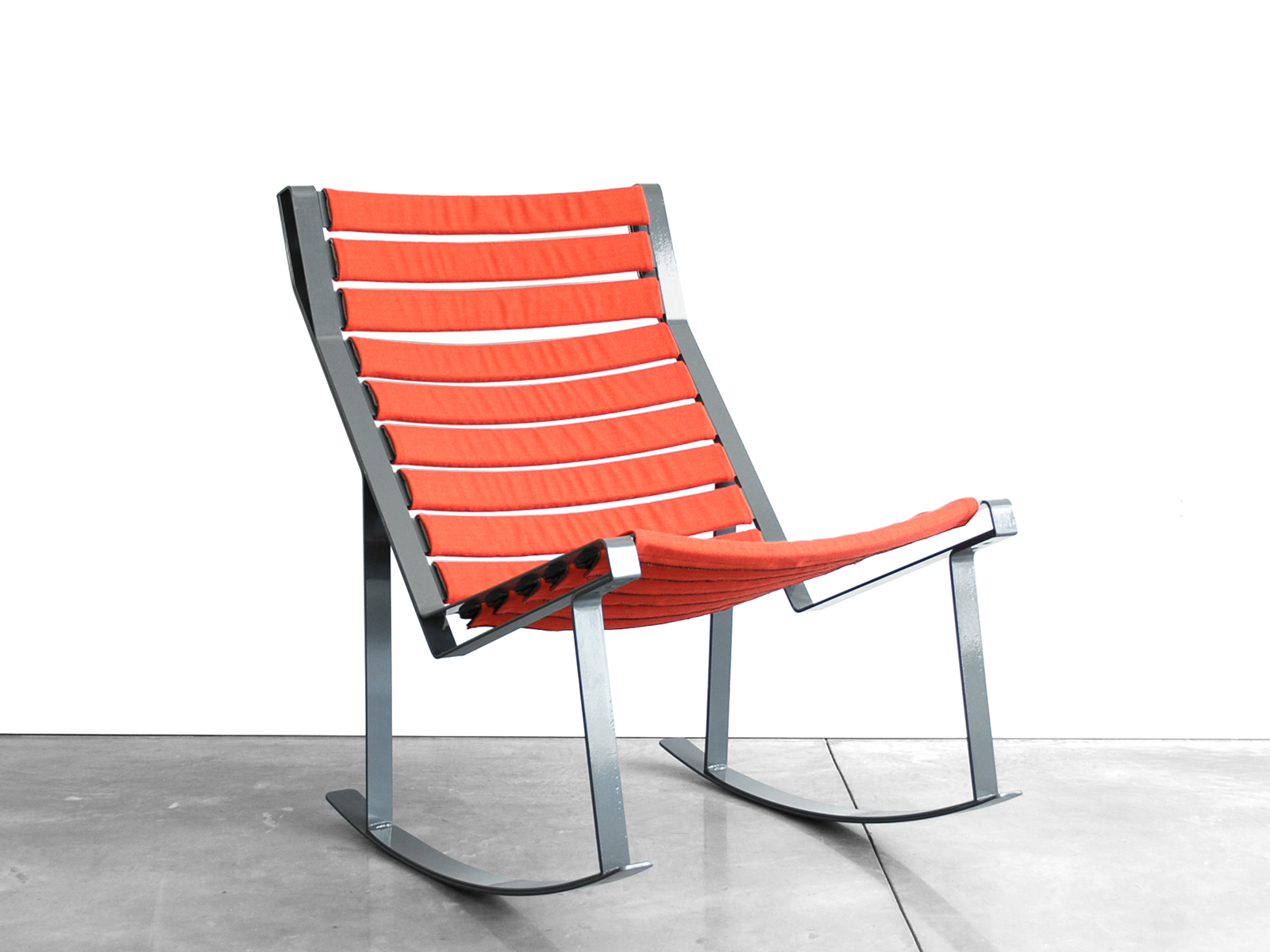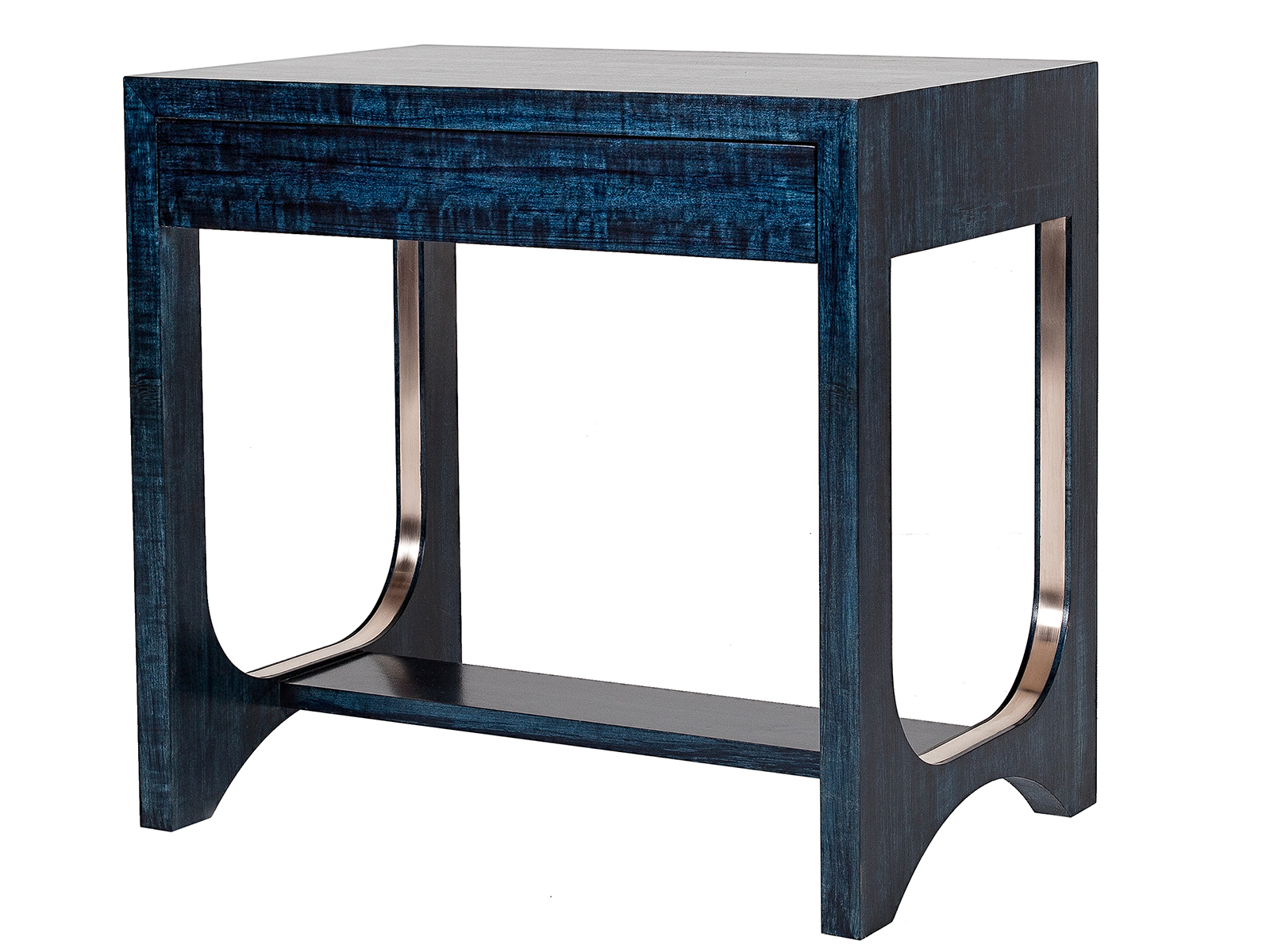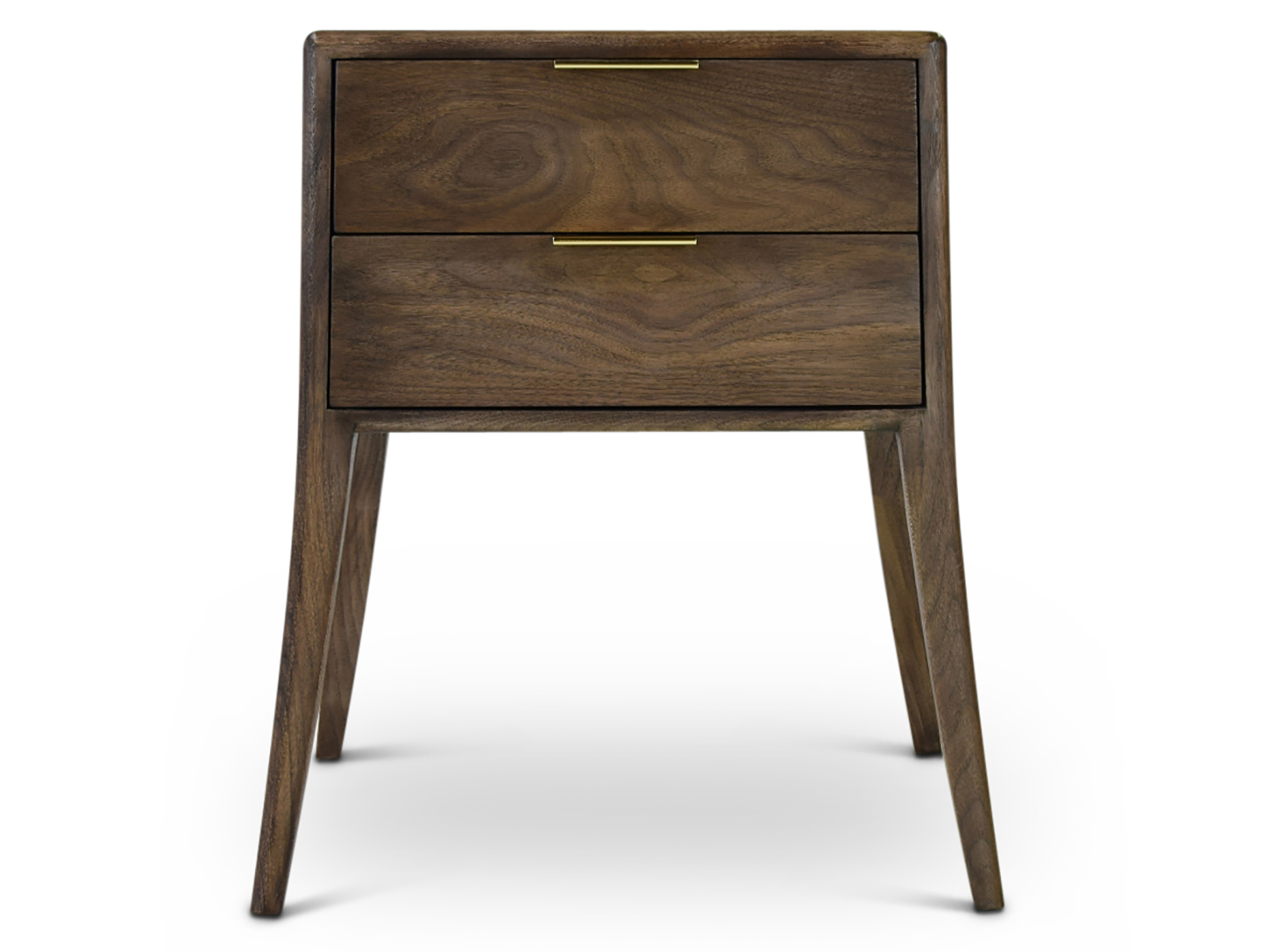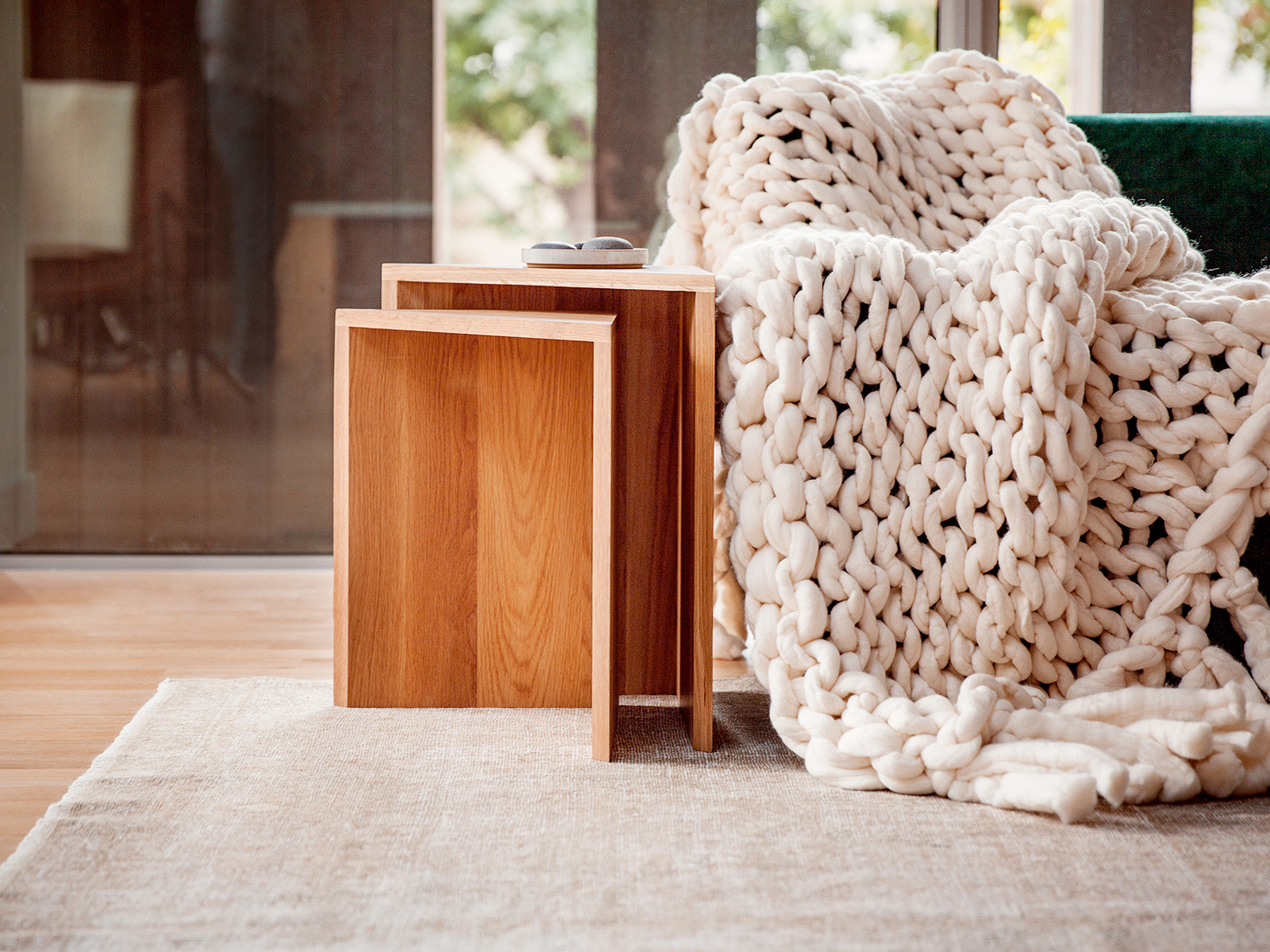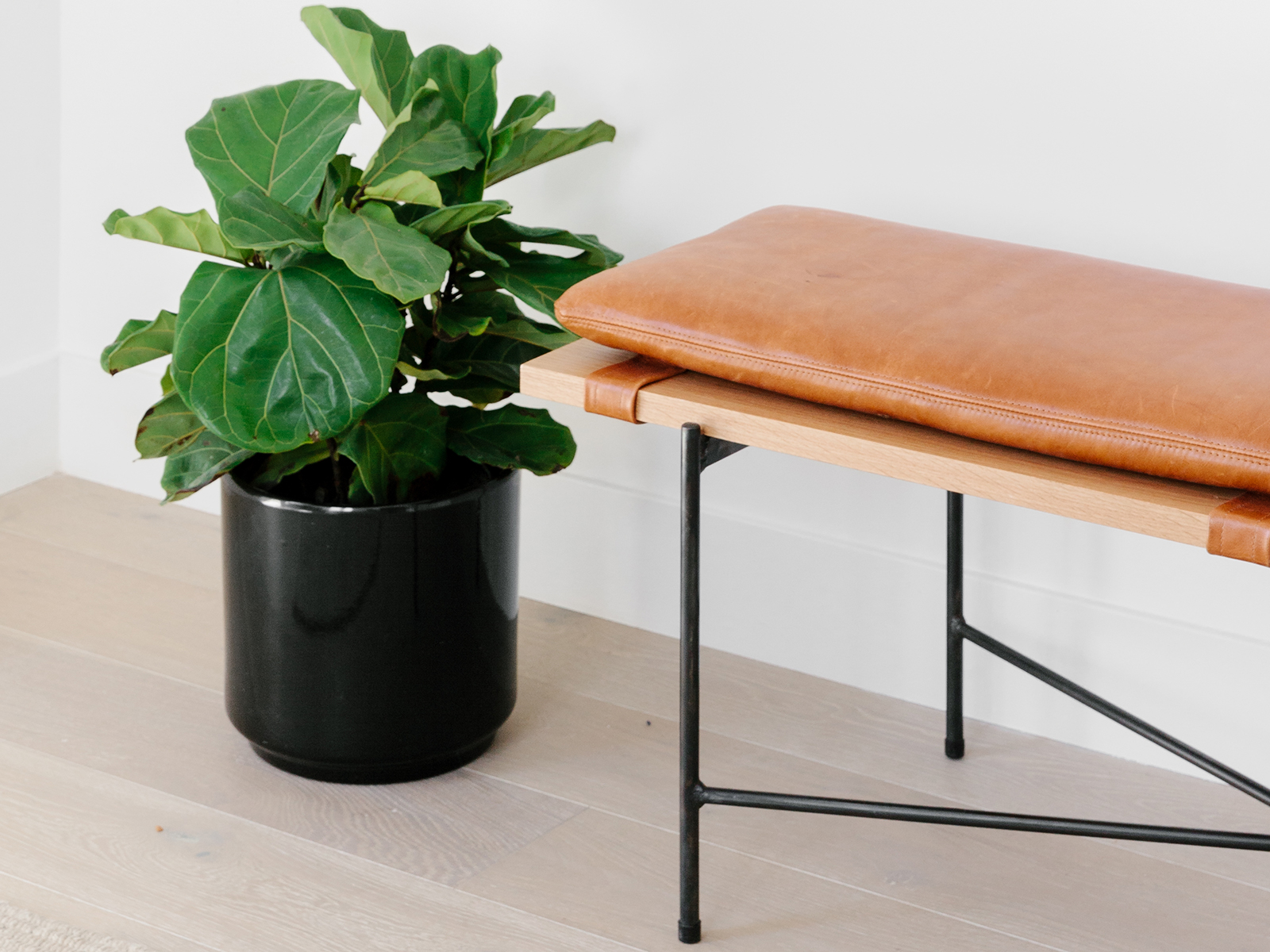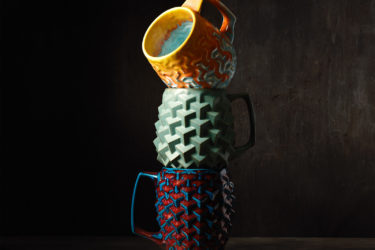The Local newsletter is your free, daily guide to life in Colorado. For locals, by locals.
You’re a locavore, sourcing your peaches from Palisade, your elk from Antonito, and your Bibb lettuce from the GrowHaus in the Elyria-Swansea neighborhood. So why are you still buying generic furniture from China? It’s easy to outfit your home with beautiful pieces designed right here in the Mile High City—and we have just the list to get you started. These six Colorado companies dream up everything from cabinetry emblazoned with mountain peaks to powder-coated rocking chairs made from recycled steel. Meet them here—and welcome their work into your home. It’s a feel-good, look-good double win.
1. The Fearless Founder: Angela Harris

If you’ve ever heard Apple’s born-in-a-garage origin story, you know that inspiration often strikes in unlikely places. Angela Harris, principal and CEO of locally owned interior design and visual-merchandising firm Trio, certainly does. “I founded Trio out of my basement more than 20 years ago,” she says. Harris had been toiling for an engineering firm before taking the plunge and enrolling in decorating classes—and spending her last $500 on Trio business cards and other startup costs.
Her courage paid off: Trio now has more than 55 employees overseeing more than 100 projects across the country, and Harris recently designed a line of furniture for Phillips Collection, a to-the-trade furniture manufacturer that has created custom pieces for Trio clients for years. Her intent for each piece—designed at the Trio studio in LoHi and made by artisans in Indonesia—was to put a modern spin on iconic minimalist furniture. Think comfy seats carved into blocks of suar wood, and ladder-backed armchairs finished in gleaming brass. “The use of unified, linear pieces celebrates simplicity, authenticity, and negative space, while square styling, channel-tufting, and beautiful metal inlays make each piece feel special and timeless,” Harris says. “We’ve taken cues from the market to create something fresh and unexpected by balancing authenticity, artistic expression, and the beauty of natural forms. People want pieces that make them feel something.”
2. The Upstart: Format Fine Goods

It wasn’t long after Joel Edmondson accepted a job as a designer for Pottery Barn in San Francisco that his dream of West Coast living started to lose its luster. The designer, who’d worked for Lorin Marsh and Symbol Audio in New York City before moving to the so-called Best Coast, was a little shocked when the lifestyle wasn’t what he’d expected. “[My wife and I] were hoping to enjoy a better work/life balance in the Bay Area as opposed to New York, but we were disappointed by the expensive housing market and difficult commute,” he says. So in 2017, when his wife accepted a job in Denver—“a city everyone aspires to be in,” Edmondson says—he took it as a sign.
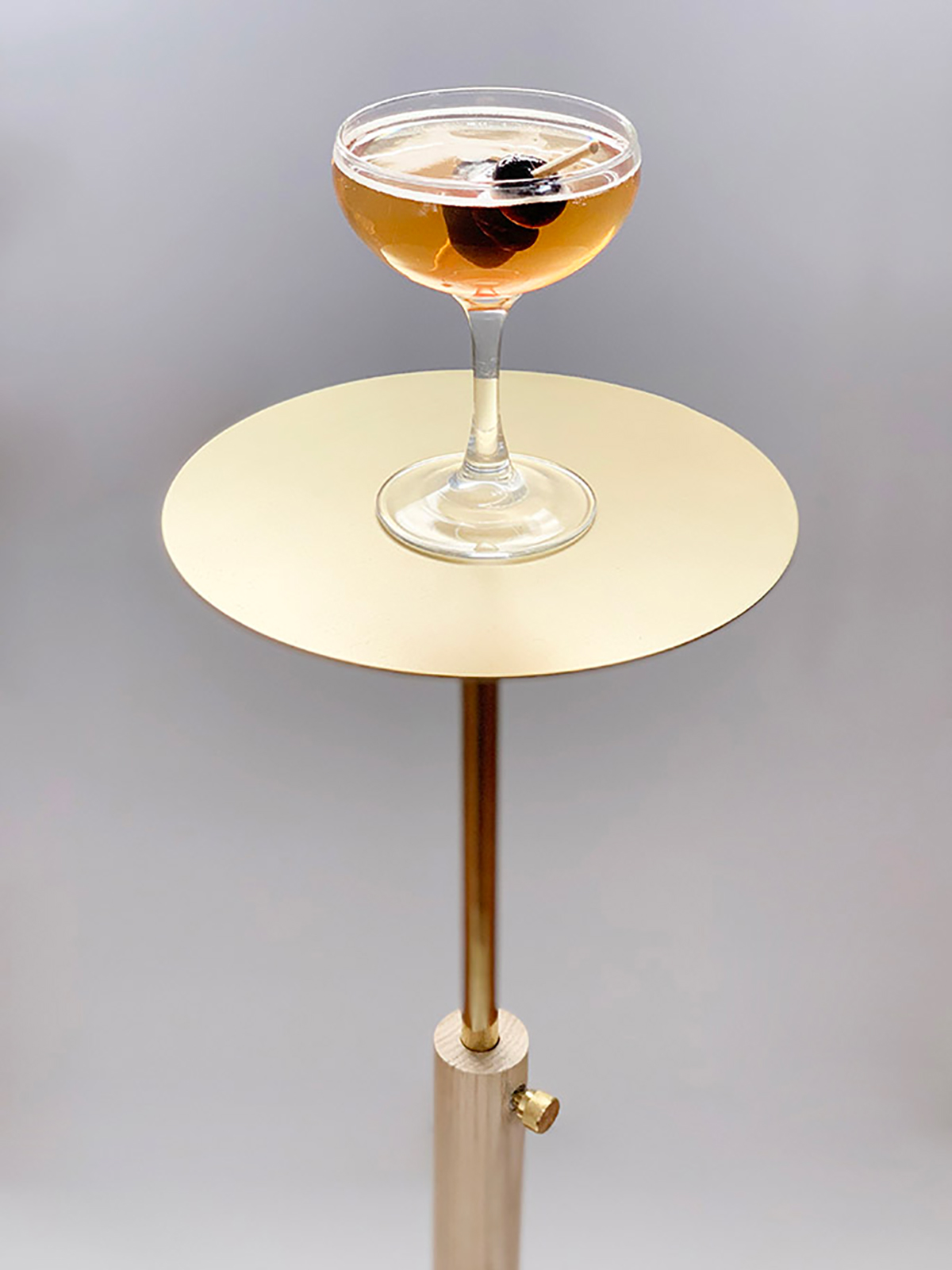
Figuring he wouldn’t be able to find a corporate furniture-design job, he used the move as an excuse to create his own line, Format Fine Goods, which he launched at New York’s International Contemporary Furniture Fair (ICFF) in May 2017. “The work is inspired by the heritage of American craftsmanship, imagined in new forms and materials,” Edmondson says. “For example, the lighting features [the slip-casting ceramic-forming] technique: It’s traditionally used to make table wares and vessels, but we’re using it in a completely new way.”

Edmondson’s unexpected collection includes a collapsible guitar stand—made of sustainably forested ash or walnut wood—that would satisfy Jimi Hendrix, and the tube-like Arches bench, which looks like something the Jetsons would recline on. Plus, it’s all crafted in the USA: Upholstered items are bench-made in the furniture-opolis of High Point, North Carolina; larger pieces, in Minnesota, and the smaller pieces and lighting are assembled and finished in Edmondson’s home studio in the Whittier neighborhood.
3. The Maker: Objeti

“I come from a family of makers and entrepreneurs,” says Joseph Ribic, founder of Objeti. He’s not kidding about his hands-on inheritance. His father founded a precision aerospace manufacturing company (in layman’s terms: he made engine parts from superalloys) after moving from Slovenia to Ohio in 1970. So when Denver-based Ribic created his first furniture collection—which he unveiled at ICFF in 2010—he took inspiration from his roots. “The name Objeti is derived from the Slovenian word for ‘embrace,’ ” he says—a nod to the brand’s signature union of form and function.
Ribic’s boutique design studio caters to architects and designers in search of modernist custom pieces and projects; recent work for restaurants has included walnut spindle chairs with candy-red legs, and fluted and distressed bar stools. “The furniture designer Charlotte Perriand [1903-1999], who worked closely with Corbusier, [has] a huge influence [on my work],” Ribic says.
Objeti fabricates its wares in-house and partners with artisans around the globe—think Amish woodworkers in Ohio, alabaster sculptors in Volterra, Italy, and even a Turkish fez-hat-maker who crafts Objeti’s Soft Tools pendant lamps, which feature white wool interiors and fez-burgundy shades.
Ribic’s next venture, Fiction, launches in August and will bring products including modular bookshelves and powder-coated sheet-metal bookends to the masses. (Objeti will keep these products in stock for quick delivery.) “Ultimately, I want to create conversations through products,” Ribic says. “My goal is to entice people into needing to find out more about my designs. And I hope the owners of each piece are so infatuated with it that they have a sentimental story about how they found it or why they bought it.”
4. The Dream Team: DoubleButter

David Larabee and Dexter Thornton are like the PB&J of Denver’s design scene—better together. “We each had our own scuffling furniture companies in Denver when we hooked up in 2006 for a show at the now-defunct and sorely missed P Design Gallery in RiNo,” says Larabee, a self-taught artisan who entered the field after “many trials, many errors.” Thornton holds an industrial-design degree with a focus on furniture from Brooklyn’s Pratt Institute. “We both needed a change and a partner,” Larabee says. “Someone to encourage the good ideas and to kill the bad ones early; someone to help carry the really heavy things.”
So the design duo founded DoubleButter, an outfit that makes all of its midcentury-inspired furniture designs in Denver and is now so beloved, the Denver Art Museum added two of its chairs—including the Roadrunner, made of oiled medium-density fiberboard—to its permanent collection. “It’s pretty clear, or at least we think it is, that we’ve got a deep respect for the midcentury design gods—the Eameses and Prouvé and Poul Kjærholm and on and on,” Larabee says. “And, of course, contemporary artists and designers too, like Piet Hein Eek and Tom Sachs.” One of DoubleButter’s newest offerings, the Grasshopper rocker, is made from recycled steel that can be powder-coated in a rainbow of VOC-free finishes.
Both Larabee and Thornton are ardent bicyclists who, during their rides through town, soak up much of Denver’s architecture as design inspiration. “We look at the honest use of materials—steel, glass, concrete, wood—in the engineered world,” Larabee says. “That stuff makes a big impression on you when you start to notice it.”
5. The Custom Queen: New Classics

The assembly-line approach to making furniture is as different as can be from the way things happen at the New Classics workshop, where only one or two artisans touch each piece. “This means an extremely high level of craftsmanship is required, from technical knowledge of veneers and hardwoods to a strong ability to problem-solve,” says owner Kirsten Zook. She should know: She bought the company from her mother, interior designer Sara Zook, who kick-started it 30 years ago when a Boulder client sought a custom reproduction of a marquetry-inlaid dressing table—and Zook couldn’t find an expert to build it. “During the 1980s, the design industry began to understand that clients wanted the antique look but modern functionality,” Zook says. “New Classics became known throughout the industry as the ‘dining table’ company due to our specialty and old-world craftsmanship.” Point proven: The firm now works with some of the most boldfaced decorator names in the country, including McAlpine House and Suzanne Kasler.
New Classics is a fount of antique-inspired and modern looks, all of which are made to order in a 21,000-square-foot shop near Stapleton. (With your designer, you can buy the pieces locally through the Shanahan Collection at the Denver Design District.) Among its new wares: a mahogany side table with an arched detail in the base that evokes the spires of Europe’s ancient cathedrals, and the futuristic Boreas table with a steel-and-mica base. Further proof that quality trumps quantity: The majority of New Classics’ makers have worked at the firm for nearly 20 years. “It’s more like one big family than just a workplace,” Zook says.
6. The Family Startup: Denver Modern

Donnie Criswell didn’t set out to launch a furniture empire nearly 10 years ago—he just wanted to make a reclaimed-wood table for his home in Boulder. But after he met and married Lindsey Price Criswell, who had worked in consumer product consulting, the pair realized that Denverites had a yen for locally designed pieces that epitomize the city’s lifestyle—which includes “an appreciation for lasting beauty, a desire to be bold without being flashy, and a collaborative and community-driven environment,” Lindsey says. Having dipped their toes in the furniture-building biz (since 2013, they’ve been fashioning custom pieces for corporate clients including WeWork and Google—and, locally, Corvus Coffee and the Wolf’s Tailor), the duo felt they could transfer that aesthetic to a direct-to-consumer line that would appeal in Colorado and beyond.
Enter their new line of furniture and home accessories, Denver Modern, which the pair launched in 2018 and currently sells online; eventually, they’ll display and sell their wares in a Clayton neighborhood showroom as well. The collection feels just right for Colorado: “We use mixtures of blackened steel, concrete, white oak, leather, and more,” Lindsey says. Adds Donnie: “What Lindsey and I are drawn to is modern, but we don’t like ‘cold’ furniture you can’t feel comfortable in and don’t want to see in your own house.” This sensibility, plus a commitment to craftsmanship that’s difficult to find in mass-produced furnishings, makes the Criswells’ line an ideal source for your next perfect piece.




